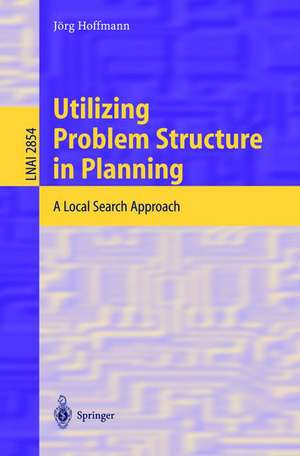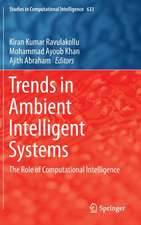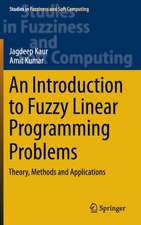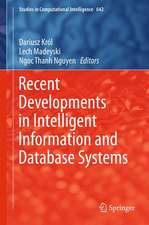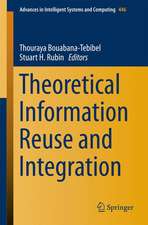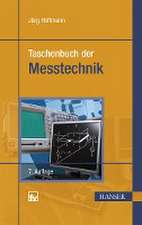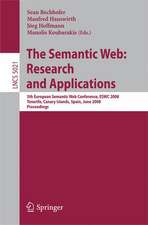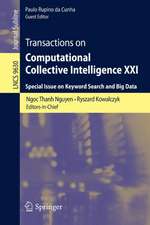Utilizing Problem Structure in Planning: A Local Search Approach: Lecture Notes in Computer Science, cartea 2854
Autor Jörg Hoffmannen Limba Engleză Paperback – 10 oct 2003
After giving a general introduction to AI planning, the book describes and carefully evaluates the algorithmic techniques used in fast-forward planning systems (FF), demonstrating their excellent performance in many wellknown benchmark domains. In advance, an original and detailed investigation identifies the main patterns of structure which cause the performance of FF, categorizing planning domains in a taxonomy of different classes with respect to their aptitude for being solved by heuristic approaches, such as FF. As shown, the majority of the planning benchmark domains lie in classes which are easy to solve.
Din seria Lecture Notes in Computer Science
- 20%
 Preț: 1061.55 lei
Preț: 1061.55 lei - 20%
 Preț: 307.71 lei
Preț: 307.71 lei - 20%
 Preț: 438.69 lei
Preț: 438.69 lei - 20%
 Preț: 579.30 lei
Preț: 579.30 lei -
 Preț: 410.88 lei
Preț: 410.88 lei - 17%
 Preț: 427.22 lei
Preț: 427.22 lei - 20%
 Preț: 596.46 lei
Preț: 596.46 lei - 15%
 Preț: 448.04 lei
Preț: 448.04 lei - 20%
 Preț: 353.50 lei
Preț: 353.50 lei -
 Preț: 389.49 lei
Preț: 389.49 lei - 20%
 Preț: 309.90 lei
Preț: 309.90 lei - 20%
 Preț: 645.28 lei
Preț: 645.28 lei - 20%
 Preț: 763.23 lei
Preț: 763.23 lei - 15%
 Preț: 580.46 lei
Preț: 580.46 lei - 20%
 Preț: 310.28 lei
Preț: 310.28 lei - 20%
 Preț: 655.02 lei
Preț: 655.02 lei - 20%
 Preț: 1183.14 lei
Preț: 1183.14 lei - 20%
 Preț: 340.32 lei
Preț: 340.32 lei -
 Preț: 449.57 lei
Preț: 449.57 lei - 20%
 Preț: 591.51 lei
Preț: 591.51 lei - 18%
 Preț: 938.83 lei
Preț: 938.83 lei - 20%
 Preț: 337.00 lei
Preț: 337.00 lei - 20%
 Preț: 649.50 lei
Preț: 649.50 lei - 20%
 Preț: 607.40 lei
Preț: 607.40 lei - 20%
 Preț: 1414.79 lei
Preț: 1414.79 lei - 20%
 Preț: 1024.44 lei
Preț: 1024.44 lei - 20%
 Preț: 583.40 lei
Preț: 583.40 lei - 20%
 Preț: 453.32 lei
Preț: 453.32 lei - 20%
 Preț: 575.49 lei
Preț: 575.49 lei - 20%
 Preț: 1075.26 lei
Preț: 1075.26 lei - 20%
 Preț: 585.88 lei
Preț: 585.88 lei - 20%
 Preț: 825.93 lei
Preț: 825.93 lei - 17%
 Preț: 360.20 lei
Preț: 360.20 lei - 20%
 Preț: 763.23 lei
Preț: 763.23 lei - 20%
 Preț: 340.32 lei
Preț: 340.32 lei - 20%
 Preț: 504.58 lei
Preț: 504.58 lei - 20%
 Preț: 369.13 lei
Preț: 369.13 lei - 20%
 Preț: 580.93 lei
Preț: 580.93 lei - 20%
 Preț: 343.62 lei
Preț: 343.62 lei - 20%
 Preț: 350.21 lei
Preț: 350.21 lei - 20%
 Preț: 583.40 lei
Preț: 583.40 lei - 20%
 Preț: 583.40 lei
Preț: 583.40 lei - 15%
 Preț: 438.59 lei
Preț: 438.59 lei - 20%
 Preț: 341.95 lei
Preț: 341.95 lei - 20%
 Preț: 238.01 lei
Preț: 238.01 lei - 20%
 Preț: 538.30 lei
Preț: 538.30 lei
Preț: 331.25 lei
Preț vechi: 414.07 lei
-20% Nou
Puncte Express: 497
Preț estimativ în valută:
63.40€ • 68.89$ • 53.29£
63.40€ • 68.89$ • 53.29£
Carte tipărită la comandă
Livrare economică 21 aprilie-05 mai
Preluare comenzi: 021 569.72.76
Specificații
ISBN-13: 9783540202592
ISBN-10: 3540202595
Pagini: 268
Ilustrații: XVIII, 254 p.
Dimensiuni: 155 x 233 x 14 mm
Greutate: 0.39 kg
Ediția:2003
Editura: Springer Berlin, Heidelberg
Colecția Springer
Seriile Lecture Notes in Computer Science, Lecture Notes in Artificial Intelligence
Locul publicării:Berlin, Heidelberg, Germany
ISBN-10: 3540202595
Pagini: 268
Ilustrații: XVIII, 254 p.
Dimensiuni: 155 x 233 x 14 mm
Greutate: 0.39 kg
Ediția:2003
Editura: Springer Berlin, Heidelberg
Colecția Springer
Seriile Lecture Notes in Computer Science, Lecture Notes in Artificial Intelligence
Locul publicării:Berlin, Heidelberg, Germany
Public țintă
ResearchCuprins
Planning: Motivation, Definitions, Methodology.- 1: Introduction.- 2: Planning.- A Local Search Approach.- 3: Base Architecture.- 4: Dead Ends.- 5: Goal Orderings.- 6: The AIPS-2000 Competition.- Local Search Topology.- 7: Gathering Insights.- 8: Verifying the h?+? Hypotheses.- 9: Supporting the hFF Hypotheses.- 10: Discussion.- Appendix A: Formalized Benchmark Domains.- Appendix B: Automated Instance Generation.
